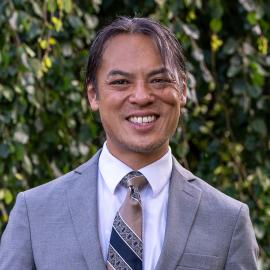
Dr Michael Legaspi
Associate Professor of Old Testament
Raised as a Roman Catholic, I attended Protestant churches as a teenager and young adult. Years of persistent questions and quiet dissatisfaction prompted me to inquire into the nature and identity of the ancient Christian church. I made my way to the works of the Church Fathers, but it was the writings of contemporary authors, especially Fr Alexander Schmemann, that first opened my eyes to the beauty, richness, and truth of Orthodoxy. My family began attending an Antiochian Orthodox Church (St John Chrysostom in York, PA), and we were received into the Church by Chrismation in 2004. Since that time, we have been a part of parishes representing several jurisdictions, not only Antiochian but also Greek, ROCOR, and OCA churches as well. My wife, Abby, and I have four grown children: Josiah, Sister Glykeria, Ana, and Cato.
Educational and Professional Background
As an undergraduate at Johns Hopkins, I focused on languages with the goal of becoming a professor of biblical studies. At that time, I began my study of Hebrew and Greek, while also studying French and German. After graduation, I taught world history and Bible at the secondary level for four years. In 1999, I began doctoral studies at Harvard University, pursuing a Ph.D. in Hebrew Bible in the Department of Near Eastern Languages and Civilizations.
While at Harvard, I received training in all aspects of historical criticism. The subject that intrigued me most, however, was the history of biblical scholarship, for it seemed to shed the most light on the larger aims and purposes of the scholarly enterprise. Working with intellectual historian Ann Blair and biblical scholars Peter Machinist and Jon Levenson, I wrote my dissertation on the role of Johann David Michaelis (1717-1791) in the development of biblical studies within the context of the modern university and the German Enlightenment. In 2010, a revised version of the dissertation was published by Oxford University Press as The Death of Scripture and the Rise of Biblical Studies.
Soon after I completed my Ph.D., I became interested in the concept of wisdom. I took part in the Templeton Foundation's Defining Wisdom project and eventually wrote a book, Wisdom in Classical and Biblical Tradition, which was published by Oxford University Press in 2018. As a faculty member at Creighton University (Theology; 2006-2010), Phillips Academy (Philosophy and Religious Studies; 2010-2014; 2020-2022), and Penn State University (Classics and Ancient Mediterranean Studies; 2014-2021), I worked on projects related both to wisdom and the history of scholarship. And now, as a member of the SVOTS faculty, I look forward to continued work in these fields as well as exegetical work informed more deeply by Orthodox Tradition.
Teaching Interests
At my previous schools, I taught courses in a variety of fields: ethics (introductory), biblical studies (introduction to Old Testament; introduction to New Testament; wisdom literature; the Apocalypse of St John), and philosophy (introductory; existentialism; philosophy of religion; the philosophy of Bruce Lee).
At SVOTS, I offer courses principally in biblical Hebrew and Old Testament studies. My hope is to explore the embeddedness and resonance of Scripture in Orthodox Tradition, while also introducing students to the aims and methods of modern scholarly approaches. I also look forward to continued engagement with philosophical topics in courses that illuminate the intellectual-historical backgrounds of theology in ancient and modern contexts.
Research Interests
• Wisdom in the Old Testament
• Psalms
• Conceptions of “history” and their relevance to biblical interpretation
• The history of modern historical criticism
• Scriptural hermeneutics
• Biblical theology
